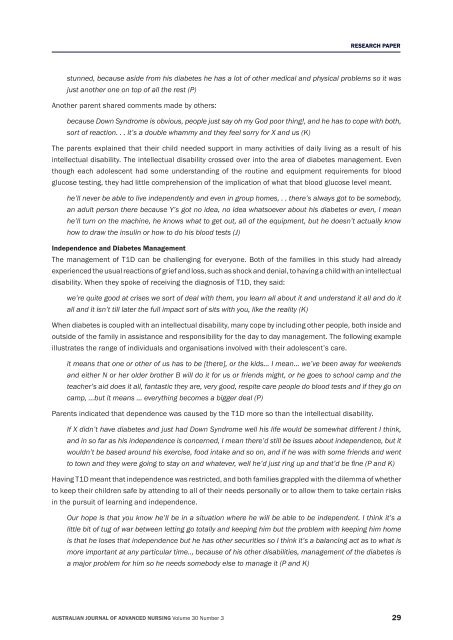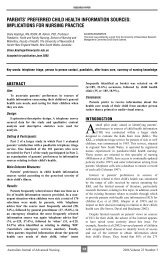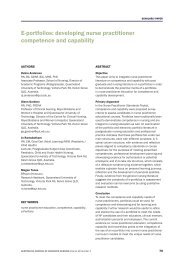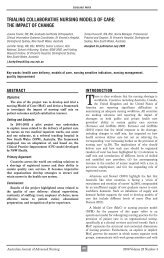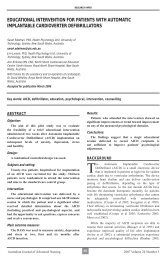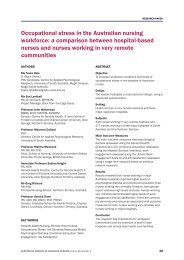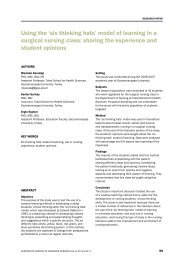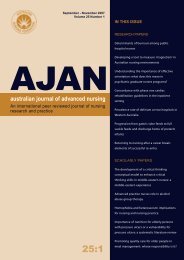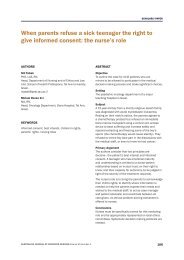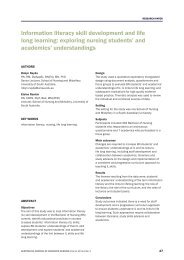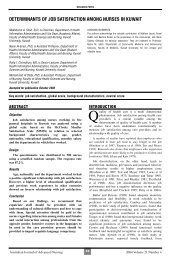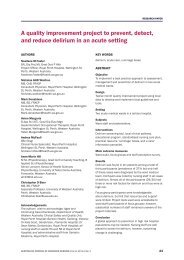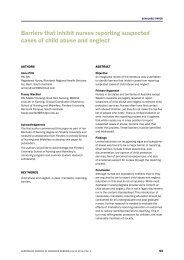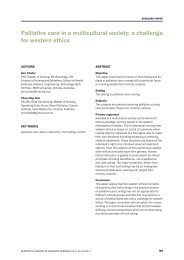Download Complete Issue - Australian Journal of Advanced Nursing
Download Complete Issue - Australian Journal of Advanced Nursing
Download Complete Issue - Australian Journal of Advanced Nursing
Create successful ePaper yourself
Turn your PDF publications into a flip-book with our unique Google optimized e-Paper software.
RESEARCH PAPERstunned, because aside from his diabetes he has a lot <strong>of</strong> other medical and physical problems so it wasjust another one on top <strong>of</strong> all the rest (P)Another parent shared comments made by others:because Down Syndrome is obvious, people just say oh my God poor thing!, and he has to cope with both,sort <strong>of</strong> reaction. . . it’s a double whammy and they feel sorry for X and us (K)The parents explained that their child needed support in many activities <strong>of</strong> daily living as a result <strong>of</strong> hisintellectual disability. The intellectual disability crossed over into the area <strong>of</strong> diabetes management. Eventhough each adolescent had some understanding <strong>of</strong> the routine and equipment requirements for bloodglucose testing, they had little comprehension <strong>of</strong> the implication <strong>of</strong> what that blood glucose level meant.he’ll never be able to live independently and even in group homes, . . there’s always got to be somebody,an adult person there because Y’s got no idea, no idea whatsoever about his diabetes or even, I meanhe’ll turn on the machine, he knows what to get out, all <strong>of</strong> the equipment, but he doesn’t actually knowhow to draw the insulin or how to do his blood tests (J)Independence and Diabetes ManagementThe management <strong>of</strong> T1D can be challenging for everyone. Both <strong>of</strong> the families in this study had alreadyexperienced the usual reactions <strong>of</strong> grief and loss, such as shock and denial, to having a child with an intellectualdisability. When they spoke <strong>of</strong> receiving the diagnosis <strong>of</strong> T1D, they said:we’re quite good at crises we sort <strong>of</strong> deal with them, you learn all about it and understand it all and do itall and it isn’t till later the full impact sort <strong>of</strong> sits with you, like the reality (K)When diabetes is coupled with an intellectual disability, many cope by including other people, both inside andoutside <strong>of</strong> the family in assistance and responsibility for the day to day management. The following exampleillustrates the range <strong>of</strong> individuals and organisations involved with their adolescent’s care.it means that one or other <strong>of</strong> us has to be [there], or the kids… I mean… we’ve been away for weekendsand either N or her older brother B will do it for us or friends might, or he goes to school camp and theteacher’s aid does it all, fantastic they are, very good, respite care people do blood tests and if they go oncamp, ...but it means … everything becomes a bigger deal (P)Parents indicated that dependence was caused by the T1D more so than the intellectual disability.If X didn’t have diabetes and just had Down Syndrome well his life would be somewhat different I think,and in so far as his independence is concerned, I mean there’d still be issues about independence, but itwouldn’t be based around his exercise, food intake and so on, and if he was with some friends and wentto town and they were going to stay on and whatever, well he’d just ring up and that’d be fine (P and K)Having T1D meant that independence was restricted, and both families grappled with the dilemma <strong>of</strong> whetherto keep their children safe by attending to all <strong>of</strong> their needs personally or to allow them to take certain risksin the pursuit <strong>of</strong> learning and independence.Our hope is that you know he’ll be in a situation where he will be able to be independent. I think it’s alittle bit <strong>of</strong> tug <strong>of</strong> war between letting go totally and keeping him but the problem with keeping him homeis that he loses that independence but he has other securities so I think it’s a balancing act as to what ismore important at any particular time.., because <strong>of</strong> his other disabilities, management <strong>of</strong> the diabetes isa major problem for him so he needs somebody else to manage it (P and K)AUSTRALIAN JOURNAL OF ADVANCED NURSING Volume 30 Number 3 29


